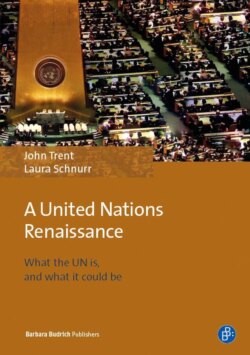Читать книгу A United Nations Renaissance - John E. Trent - Страница 7
На сайте Литреса книга снята с продажи.
Achieving the unthinkable
ОглавлениеThe world has never been a better place. We live in the most peaceful and prosperous era in human history. More than one billion people have been lifted out of extreme poverty in the past 25 years. From the early 19th century to the mid-20th century, the vast majority of the world’s population lived in extreme poverty (Roser and Ortiz-Ospina, 2017). We have not experienced a war between major powers in decades. The majority of people live in democratic countries, compared to just over 10 per cent of the world population a hundred years ago. Technological advances have rapidly spread across the globe, with more people connected to one another and to information than ever before. Tens of millions of lives have been saved from small pox, polio, measles, malaria and tuberculosis, while HIV/AIDS infections and deaths have dropped substantially. More people have access to education and basic health care, and incomes in the developing world are rising.
We often forget this as we are constantly fed a stream of bad news from the media and from politicians eager to stoke fear and insecurity. We urgently need perspective.
None of this means we should sit back contently, satisfied with the headway we have collectively made. Climate change has exacerbated risks such as water crises, food shortages, social cohesion, livelihoods and security. Terrorism poses a very real threat to our security and stability. Intrastate conflict is [14] devastating for individuals affected while also having regional and global consequences. We remain far from an adequate solution to the migration crisis caused by political and economic instability in the Middle East and North Africa. We need to respond rapidly when global pandemics occur, as they can spread like wildfire. There is no guarantee that we will avoid another global financial crisis similar to the one experienced in 2008-09.
The threats of our time are not like those of past eras that could often be solved by individual states alone or perhaps by a few states within a region. The diverse challenges we face today do share several common characteristics: they are increasingly complex in nature and they transcend national borders. Consider the hundreds of thousands of migrants and refugees who entered Europe in 2016 by crossing the Mediterranean Sea and arriving in Italy, Greece, Spain and Cyprus. Or the rapid spread of the Zika virus, which was confirmed to be present in Brazil in 2015 and by September 2016 had reached 48 countries and territories in the Americas and 10 countries in the Pacific, Asia and Africa (PBS Frontline). We know that the so-called Islamic State has developed a global network, to a great extent through social media, that has allowed it to recruit a large number of Western fighters to carry out terrorist attacks in cities like Paris and Brussels, while having branches around the world including in Yemen, Libya, Afghanistan, Bangladesh and West Africa. Similarly, climate change knows no borders; with rising sea levels, we have seen how carbon emissions in the one part of the world have threatened the very existence of island states on the other side of the globe.
These transnational issues require a deeper level of cooperation and coordination between states. They call for strong international laws and norms. Most importantly, they demand effective global institutions to develop and deliver coordinated responses. Yet few would disagree that such institutions remain a distant vision and that in its current state, the United Nations, the only international organization of its kind, is not up to the task.
So, with all this discouraging news, why did we begin this book on a positive note? The answer is simple: given the magnitude of our problems and the barriers we need to overcome, it is useful to remember that we have achieved incredible progress in recent decades—progress that previous generations would likely never have imagined possible. Just as we have surpassed expectations in creating peaceful continents and in advances in areas such as health, development and technology, we are equally capable of reforming the United Nations system so it is able to meet present and future challenges. Filling the emerging void in effective global governance will certainly not be easy, but history tells us it is possible.
